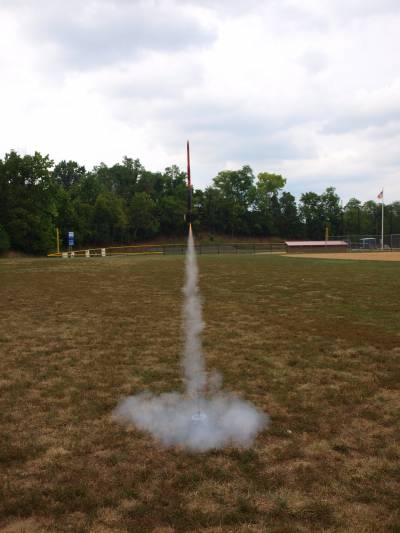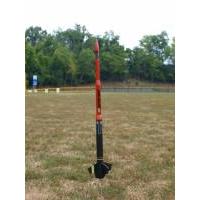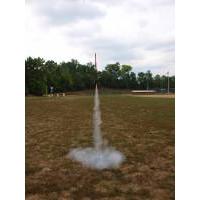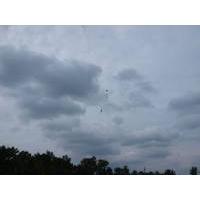| Construction Rating: | starstarstarstarstar |
| Flight Rating: | starstarstarstarstar |
| Overall Rating: | starstarstarstarstar |
| Published: | 2015-01-24 |
| Diameter: | 1.33 inches |
| Length: | 28.25 inches |
| Manufacturer: | Estes  |
| Skill Level: | 1 |
| Style: | Sport |
 Brief
Brief
The Vector Force reminds me of another recent Estes offering, the Stratocruiser, in that they're both rockets that Estes got right from start to finish. I've built them both and painted them as close as possible to the face card, and the results have been two of the better looking recent rockets in my fleet by far. Both are fairly easy to build 4fnc birds, but sometimes that's all you need if you do it right.
Components
- 12" BT-55 main body tube
- 6" BT-50 body tube
- 6" BT-20 body tube
- 2.75" motor tube
- engine hook
- engine retainer ring
- engine block
- large balsa tube adapter
- small balsa tube adapter
- BNC-20 nose cone
- laser cut balsa fin stock
- launch lugs (2)
- elastic shock cord
- decals
- screw eye
- parachute
Construction
First of all, I was very impressed with the fact that the Vector Force uses through the wall (TTW) fins. It's a nice detail and makes fin alignment quite a bit easier. The lower fins are two piece, but thanks to the laser, align and glue up just perfectly. Care must be taken when constructing the engine mount because lining the retainer ring up with the appropriate slots in the root edge of the main fins is fairly critical. I didn't bother with the small upper fins. Past experience has taught me that fins like that were likely to break off, and they didn't add that much to the design in my opinion.
Finishing
The suggested orange and black paint scheme played right into my strengths. Orange and black are one of my favorite color combos, and lately I've been impressed with the Testors black metallic and flaming orange lacquer. They're perfect for this rocket, look great together, and look amazingly close to the face card picture. Of course, all this amazing is made possible by prepping the surface beforehand, which I accomplished with the usual suspects, Valspar primer, thinned Elmer's Carpenters Wood Filler and sandpaper for eliminating balsa grain and tube spirals. As usual, I went with two coats each of primer and CWF, sanding in between coats, before getting impatient and deciding that no museum would be calling and from ten feet they looked great. That's my life. Welcome to it.
Flight
First flight was on a fairly calm afternoon at B6-4 Field. Winds were so light as to be negligible, but I was still nervous about trying the Vector Force on a B6-4 without seeing the A8-3 first. The A8-3 flight was one of those where you think "I can throw it that high," but it was stable, the chute worked perfectly, and the low level flight allowed me to follow the action through the viewfinder with relative ease. After topping out around the 150' mark, recovery was noneventful and happened across the field behind first base. The flight was low, stable, and gave me the confidence to try again later in the afternoon on the B6-4.
The second flight was perfect, and made me wonder why I'd ever worried about the B overflying the field. What little wind there was caused the VF to windcock slightly, but it was a gently bowing path back over Woodfill Avenue, well over the phone wires and away from any trees. Ejection occurred just as the rocket tipped over at around the 300' mark, and it rode the breeze across the field toward first base, landing well foul in the no-man's land between the two fields. A string of bad weather luck on the large field launches has thus far kept me from trying the Vector Force on a C6-5, but I'm optimistic for the coming spring being more forgiving for my rocketry opportunities.
Flight Rating: 5
Summary
Pros: Classic good looks and a great paint and decal scheme. Great performance
Cons: None. Add this one to your fleet.

Other Reviews
- Estes Vector Force By Rich DeAngelis (August 17, 2011)
The design of the Vector Force appears to have been inspired by military air-defense missles, but it is not a scale or pseudo-scale model by any means. It's just (to me) a good-looking kit. It is fairly large and uses standard 18mm motors (B & C power). The unique design features are it's two transition/reducer sections and a second set of small "finlets" a few inches ahead of the main ...
 |
 |
Flights
Sponsored Ads
 |
 |















